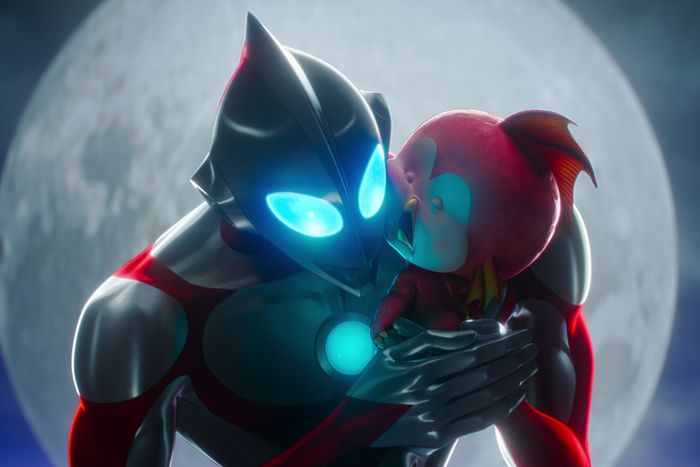Ultraman: Rising Review: It's What We Call a Parents' Movie

By Eric Vilas-Boas, a Vulture editor who covers streaming and animation. He won a New York Press Club Award for "The 100 Sequences That Shaped Animation" in 2021.
Ultraman: Rising’s canniest trick is the way it sustains narrative momentum while staying true to the realities of new parenthood. Photo: Netflix
All newborns are basically kaiju. My son is 9 weeks old, and his breath is atomic, his roar is ear-splitting, and his growth rate (already double his birth weight!!) is alarming. There’s nothing a giant monster can do that he can’t, short of demolishing a city — though as his dad, I think that’s probably worth testing on our next round of tummy time. The buzzier animated family release of Father’s Day weekend may be Pixar’s Inside Out 2, but Ultraman: Rising (out today on Netflix) intimately understands the baby-kaiju connection.
Directed by Shannon Tindle and co-directed by John Aoshima, Ultraman: Rising is, on the surface, an Americanized update to a decades-old superhero franchise. Tsuburaya Productions debuted Ultraman in a 1966 TV show, where the character’s powers allowed him to grow to the size of a tall building and fight giant monsters. You can track Ultraman’s massive footprints everywhere in Japanese media and beyond, from the Super Sentai (a.k.a. Power Rangers) series to Pokémon to Neon Genesis Evangelion. Rising introduces Ken Sato, an initially self-centered Ultraman whose life and family are radically changed when a tiny (errr, truck-size) kaiju baby hatches in his hands and immediately imprints on him. She almost immediately tries to suckle on his Ultra chestplate.

Their encounter unlocks the movie. There’s a shot in which she emerges from Ken’s arms and the camera tracks her attentively around his Ultra body as she shakily takes her first steps, jump, and roll before he scoops her back up. Before he can think, Ultraman’s bachelor life and baseball career have blown up. He has to juggle not only his new fatherly duties and a day job but also his heroic secret identity — even as kaiju-killing military forces hunt for his adopted baby. Ultraman: Rising may be a kaleidoscopically color-timed action adventure of throw-down battles, but it’s really about parenting in its many shapes and forms. That’s a refreshingly specific focus for a genre film pinned on one of the most theoretically exploitable IPs in the world. The movie makes nerdy references to baseball, Akira, Pac-Man, Tindle fave Hayao Miyazaki, and Ultraman lore, obviously, but it also speeds through topics parents encounter almost as soon as they meet their infant: the five S’s, spit-up, neglect, attachment theory, and developmental milestones.
Ultraman is an imperfect dad, but far from the only one in the movie, and his own fatherhood helps to heal his fractured relationship with his dad. The film presents multiple healthy and unhealthy types of parenthood — neglectful parents, tragic parents, absent parents, robot parents, single parents, military dads, bicoastal parents, dead parents, surrogate parents, grandparents, and the list goes on. Ultraman goes in unprepared for his new responsibility, both because he has his own growing up to do, but also because information on kaiju infants is frustratingly hard to Google or ask Siri about — just like it is with human infants!
Ultraman: Rising’s canniest trick is the way it sustains narrative momentum while staying true to the realities of new parenthood. I watched Ultraman: Rising when my son was 4 weeks old, on the first day his mom had stepped out of the house for a few hours since he was born. Forty-five minutes in and between bottles, I paused it to make a panicked telehealth call to our doctor to confirm that some swelling and redness on his left eyelid was, in fact, absolutely nothing to worry about. (He just likes tilting his head that way while sleeping.) Like Ken, I’d already dealt with new sleep and eating habits, an anal-retentive approach to nesting, a surprisingly early birth, a newfound protective instinct, and a need to renavigate boundaries with my own parents. More than a month later, parenting has gotten easier in some ways, but harder in others: I’ve gone back to work while Mom’s taken the lead on his daytime care and development, his feeding needs have shifted, and we’ve put in several more just-in-case calls to doctors and poison control. Ultraman: Rising makes the case that all that discomfort is worth it because the rewards are obvious. Like The Secret of NIMH or The Incredibles before it, it’s a family-friendly animated feature, but I wouldn’t call it a “kids’ movie.” It’s explicitly a “parents’ movie.” As Ultraman’s mom tells him, “Someday, when you have kids of your own, you’ll understand.”













































